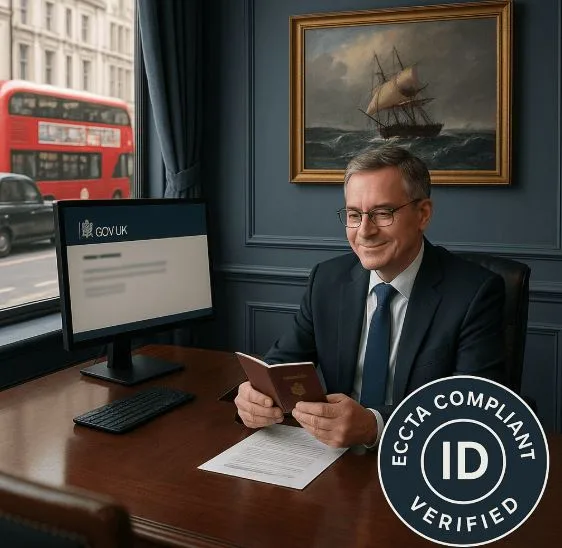How US-Based Directors of UK Companies Can Comply with ECCTA’s New ID Verification Rules — Using IDVT with Edward Young Notaries & Lawyers
When the Economic Crime and Corporate Transparency Act 2023 (ECCTA) takes full effect, it ushers in a radical shift in how Companies House will police identity verification for company directors and people with significant control (PSCs). From autumn 2025, verification will not be optional — it becomes a legal gatekeeper to filing, appointments, and corporate operations.
For many US-based individuals who serve as directors of UK companies, complying with these changes can be a complex challenge: remote identity checks, document standards, cross-border regulation. But innovations in IDVT (Identity Document Validation Technology) make the path far more navigable. In this article, we explain ECCTA’s identity regime, the risks of non-compliance, and how Edward Young Notaries & Lawyers is enabling US-based directors to verify safely, quickly, and in conformity with the law.
1. Background: ECCTA & the New Identity Verification Regime
Why the change?
The UK government has long been criticised for weak corporate transparency and potential misuse of company structures for fraud, money laundering, and shell operations. ECCTA transforms Companies House from a passive registry into an active gatekeeper, mandated to verify who is behind every filing.
Key provisions
- Voluntary verification starts 8 April 2025 — individuals may proactively verify their identity even before it becomes legally required.
- Mandatory regime from Autumn 2025 — all new directors and PSCs must complete IDV before incorporation or appointment. A transition period of up to 12 months will apply to existing directors via their next confirmation statement.
- After full enforcement, filings will be blocked if identity verification has not been completed.
- Identity verification must use approved document standards and cryptographic / digital validation when applicable (for example, biometric passports) per Companies House “How to meet identity verification standards” guidance.
Thus, for a director in the US with a British / foreign company role, this means one cannot simply rely on in-person checks or embassy attestation — the digital route is mandatory or must be trusted via an agent (an ACSP).
2. Who Must Verify their Identity Under ECCTA
The scope is broad. Not only new directors but existing ones, PSCs, LLP members, and anyone making filings on behalf of a company are covered.
For US-based directors, this includes:
- Newly appointed director roles in UK companies (they must verify before filing).
- Existing directors or PSCs, when their company’s next confirmation statement arises.
- Overseas companies / UK establishments, as ECCTA is expected to require identity verification for directors of overseas entities that register UK branches.
If verification is not done:
- Filings (e.g., confirmation statements, new appointments) may be frozen
- Directors may face fines, disqualification, or corporate penalties.
In short: for US directors, this is not a compliance nicety but a legal requirement to keep the company functional.
3. Traditional Routes vs IDVT: Challenges for US Directors
GOV.UK One Login / In-Person Options
Companies House provides several verification pathways.
- One Login / digital app or web route, using biometric passports or driving licences.
- Face-to-face verification at select Post Offices (UK-based).
- These routes often assume UK residence, UK-issued documents, or proximity to UK offices — a limitation for US directors.
- Some document types (non-biometric passports, older IDs) may be rejected.
- For US directors lacking UK proof-of-address or UK-issued ID, the GOV route may be blocked or rejected.
The Dilemma
If the US director uses a foreign passport or lacks UK address, the standard routes may fail. Also, delays, technical errors, or mismatch issues can halt company operations. Many will fall back to third parties.
Thus, the agent / ACSP route becomes essential — especially when backed by strong digital identity validation (IDVT) methods.
The best ACSP for accessability and transparency on price we’ve found is Notary Public London – Edward Young, who is registered with Companies House as an ACSP. You can check out their ID Verification Service.
4. What is IDVT & Why It’s a Game-Changer
IDVT (Identity Document Validation Technology) is software (or service) that analyzes and authenticates identity documents by verifying their cryptographic security features, checking holograms, machine-readable zones, and biometric data consistency. It acts as an automated “digital expert” for identity.
Key features of IDVT:
- Cryptographic validation — ensures the document is genuine and unaltered.
- Document cross-checks — compares facial biometrics with selfies, watches for tampering.
- Global document compatibility — supports a wide range of national passports, driving licences, residence permits, etc.
- Audit trail & logs — traceable for compliance, audits, and legal defence.
In effect, IDVT bridges the trust gap: a US director can hold a foreign biometric passport, scan it via an IDVT-enabled app, take a live selfie, and have the system verify authenticity — meeting Companies House’s document standards even from overseas.
Companies House guidance now allows or requires IDVT in “Option 1” verifications, specifically when cryptographic features are validated by technology.
In summary, IDVT turns what used to require physical inspection into a remote, secure, audit-compliant solution — making it ideal for cross-border director verification.
5. How Edward Young Notaries & Lawyers Uses IDVT to Help US-Based Directors
Notary Public London – Edward Young recognized early that ECCTA’s requirements would disproportionately challenge directors outside the UK. Our solution was to integrate IDVT into our ACSP offering, tailored for US-based clients.
How our process works (5-step flow):
- Pre-check & guidance
We review the director’s passport (or other ID), address proof, and residency to determine eligibility.
If the ID is non-biometric or there’s complexity, we advise alternative paths. - Secure digital link to IDVT platform
We send the director a secure, encrypted link to capture identity documents and a live selfie via an app or browser. - Automated validation & human review
The IDVT engine validates the document’s cryptographic features, compares with selfie, flags anomalies. Where needed, we apply human verification from forensic document experts. - Submission to Companies House
Once validation is confirmed, we file the identity verification as an ACSP agent, linking the identity to the director’s role and requesting the issuance of a Companies House personal code. - Tracking and audit report
We provide clients an audit-ready verification report, the personal code (when issued), and instructions for future filings.
Key advantages for US directors:
- Cross-border support: Works even with non-UK passports (if biometric) or global identity documents.
- Speed: In many cases, verification can be done within hours rather than days.
- Reliability: Minimizes document rejection risk because validation is deep, systematic, and audit traceable.
- One-time verification: Once verified, the same identity is valid across all director / PSC roles under that individual’s personal code.
They are rigorous about AML supervision and regulatory compliance, ensuring our operations as an ACSP remain within Companies House and AML regulatory frameworks.
6. Real-World Use Case: US Director of a London Holding Company
Let’s take a representative example:
Scenario: Jane Smith lives in Chicago and is appointed director of a UK holding company. She holds a US biometric passport and occasional UK visits, but no UK address.
Challenge: She must verify her identity under ECCTA to be eligible to act and to file through Companies House.
Solution via Edward Young Notaries & IDVT:
- Jane uploads her biometric passport scan via our secure platform.
- She takes a selfie on her phone.
- The IDVT system validates the document cryptography, facial matching, and face-liveness checks.
- Minor discrepancy flagged (old photo), but human review confirms identity after additional questions.
- We submit via ACSP route, she receives a personal code from Companies House, and subsequent filings (confirmation statements, director appointment) proceed smoothly.
Result: Jane avoids delays or rejection by GOV.UK One Login, and her directorship is maintained without interruption.
7. Broader Implications & Strategic Tips
For US directors and service providers:
- Act now — voluntary period has begun. Early verifications avoid bottlenecks during transition.
- Document readiness — ensure biometric passports, address proofs, and clean digital scans.
- Choose trusted ACSPs with IDVT and audit capabilities (like Edward Young).
- Retain audit logs — for internal governance and audit evidence.
For compliance & governance teams:
- Prepare transition plans so newly appointed directors are verified before their appointment.
- Keep track of each director’s personal code status and associated roles.
- Alert clients about geographic challenges (e.g. non-biometric passports, renamed identity documents).
Conclusion
The identity verification regime under ECCTA is one of the most consequential legal changes for UK corporate governance in decades. For US-based directors of UK companies, it introduces new operational complexity — but not insurmountable barriers.
By combining IDVT technology and fully compliant ACSP services, firms like Edward Young Notaries & Lawyers are making it viable for foreign directors to satisfy UK identity standards without travel or diplomatic hassle.
If you’re a US director or advisor navigating these new rules, the path ahead is clear: adopt digital identity verification now, partner with an experienced ACSP, and ensure your corporate governance remains uninterrupted and ECCTA-compliant.






